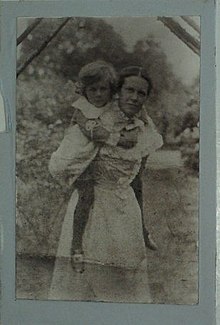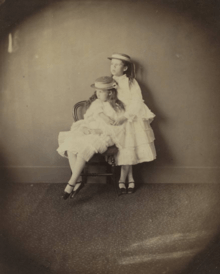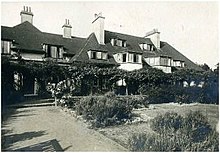Julia Huxley
Julia Arnold later Julia Huxley (1862 – 1908) was a British scholar. She founded Prior's Field School for girls, in Godalming, Surrey in 1902. She came from and had an exceptional family.
Julia Arnold | |
|---|---|
 Julia and Aldous in 1898 | |
| Born | Julia Arnold 1862 |
| Died | 1908 |
| Education | Somerville College |
| Occupation | head |
| Known for | founding a school |
| Spouse(s) | Leonard Huxley |
| Children | 4 |
Life
Arnold was born in 1862.[1] She was the niece of critic Matthew Arnold and the sister of Mrs. Humphry Ward and the suffrage campaigner Ethel Arnold.
She met Lewis Carroll as a child and she and her sister Ethel featured in a number of his photographs. Ethel later reported that she enjoyed the attention as a break from her less than happy home life. Ethel was to remain friends with Lewis Carroll as an adult. For Christmas in 1877, Lewis Carroll devised the word game of Doublets for Julia and Ethel. The game was later published by Vanity Fair and by Carroll.[2]

She went to Somerville College, Oxford where she was awarded a First in English Literature in 1882.[3] Julia and Leonard Huxley married in 1885.[3]

Arnold founded in January 1902 a remarkable school which was Prior's Field School for girls, in Godalming, Surrey.[4] The school started with a five-acre (2 ha) plot and a moderately sized house designed by C.F.A. Voysey,[4] Julia Huxley opened her school with herself as head with one boarder, five day girls, Miss English, Mademoiselle Bonnet, a wire-haired terrier and her 7 1⁄2-year-old son, Aldous.[5]
As head she taught her charges to enjoy culture and solitude and to be bibliophiles. She was a clever and talented teacher who had a relaxed discipline.[6]
Death and legacy
She died of cancer in 1908.[1] She died at the age of 46, after only six years as Headmistress. In June 1908 her school had 85 pupils and 86 "Old Girls".[4] She was succeeded as head by Ethel Burton-Brown who had been her manager.[5]
Julia's funeral service took place in the remarkable Watts Cemetery Chapel and she was buried close to one of it walls. The pupils from the school attended the service. Leonard Huxley and her son Aldous's ashes would also be buried there.[5]
In March 2017, the school she founded, opened a new Science, Technology and Music Centre, named the Arnold Building in memory of her.[7]
Private life
Julia and Leonard Huxley married in 1885 and they had four children: Margaret (1899-1981), the novelist Aldous, Trevenen and Julian.[3]. Julia wrote a letter to Aldous as she was dying and he carried this with him for the rest of his life. It included the thought "Judge not too much and love more". Scholars of Aldous's works can see his mother's death in his cynical attitude and his books including Eyeless in Gaza, Brave New World and the Utopian Island.[5]
References
- "Huxley, Leonard (1860–1933), biographer and writer". Oxford Dictionary of National Biography. doi:10.1093/ref:odnb/34083. Retrieved 2020-06-30.
- Cohen, Morton N. (2015-04-09). Lewis Carroll: A Biography. Pan Macmillan. ISBN 978-1-4472-8614-1.
- Clark, Ronald W. (1968). The Huxleys. Heinemann.
- Prior's Field School – A Century Remembered 1902–2002 by Margaret Elliott, published by Prior's Field School Trust Ltd, ISBN 978-0-9541195-0-8.
- Murray, Nicholas (2009-06-04). Aldous Huxley: An English Intellectual. Little, Brown Book Group. ISBN 978-0-7481-1231-9.
- "Julia Huxley, the campaign for women's suffrage and Prior's Field School". Exploring Surrey's Past. Retrieved 2020-06-30.
- "Leading-edge school development, rooted in the past". UK Boarding Schools. Retrieved 2020-07-01.